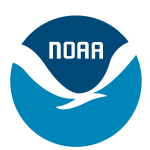- Industrie: Government
- Number of terms: 30456
- Number of blossaries: 0
- Company Profile:
NOAA Coral Reef Conservation Program, National Oceanic and Atmospheric Administration, U.S. Department of Commerce
1. To observe and record changes; 2. The collection of information for the purpose of assessment of the progress and success of a plan. Monitoring is used for the purpose of assessing performance of a management plan or compliance scheme and revising them, or to gather experience for future plans.
Industry:Fishing
1. Act of transferring the catch from one fishing vessel to either another fishing vessel or to a vessel used solely for the carriage of cargo; 2. Off loading and on loading or otherwise transferring fish or fish products and/or transporting fish or products made from fish.
Industry:Fishing
A set of reference data sets or analyses used for comparative purposes; it can be based on a reference year or a reference set of (standard) conditions.
Industry:Fishing
A balancing of factors all of which are not attainable at the same time (e.g. maximum economic yield, MEY, and maximum sustainable yield, MSY). A giving up of one thing in return for another.
Industry:Fishing
As part of the National Environment Policy Act (NEPA) process, a FONSI is a document that explains why an action that is not otherwise excluded from the NEPA process, and for which an environmental impact statement (EIS) will not be prepared, will not have a significant effect on the human environment.
Industry:Fishing
1. In general, and mainly for trawling, the fishing effort exerted per unit of areas (e.g. in hours of trawling per 100 square miles). In stock assessment theory, the effective (or standard) fishing effort per unit area must be proportional to fishing mortality through the relation F = q(f/A) where (f/A) is the fishing intensity, and q is the catchability coefficient; 2. Effective fishing effort; 3. Fishing effort per unit area; 4. Effectiveness of fishing.
Industry:Fishing
A harvest category specific to Native American tribes representing fishing rights granted by treaty.
Industry:Fishing
1. In general, the incompleteness of knowledge about the states and processes in nature; 2. In statistics and risk analysis, refers to the estimated amount (or percentage) by which an observed or calculated value may differ from the true value; 3. Lack of perfect knowledge of many factors that affect stock assessments, estimation of biological reference points, and management.
Industry:Fishing
